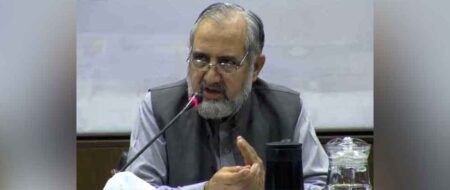Current Crisis of Capitalism
In the wake of prolonged global recession and the movement to occupy the Wall Street, the Institute of Policy Studies Islamabad (IPS) organized a seminar on “Current Crisis of Capitalism”, which was addressed by leading experts on economics including Senator Professor Khurshid Ahmad.
In the wake of prolonged global recession and the movement to occupy the Wall Street, the Institute of Policy Studies Islamabad (IPS) organized a seminar on “Current Crisis of Capitalism”, which was addressed by leading experts on economics including Senator Professor Khurshid Ahmad, Director General Federal Urdu University Professor Dr. Nawab Haider Naqvi, former Chief Economist Government of Pakistan Fasihuddin and Professor Zafar Iqbal while a select gathering of professionals as well as students of economics attended the session.
The speakers highlighted that the capitalist economy had seen recession and depression on almost periodical basis and initially the current crisis too seemed to be the one like the previous but as it deepened, it was realized that the problem is not merely with economic conditions but with the capitalism. Soon after the claims of End of History with the liberal economy as final destination of mankind in the field of economics, the world was shaken by the worst financial crisis. Identifying the factors that had contributed to the current crisis, speakers said that rising unemployment in result of rapid technological advancements, disproportionate distribution of the gains of growth, poor governance and misplaced faith in public sector had resulted in present crisis. Monetary transactions are dominating the society with physical transactions being only one-fiftieth of them and “growth in real economy is far lesser than growth in financial sector”.

Taking on the philosophy behind the capitalist system, economic experts said that greed is driving force in capitalism and all market activity is driven by the motive of profit maximization. This approach does not only increase gap between the rich and the poor and start a rift in the society but also makes the public policies more in favor of the rich. It was for this reason that capitalists who had otherwise resisted any oversight or regulation by the government were successful in acquiring government intervention when they were in shallow waters. Describing pro-rich policies of the governments, it was cited that United States had paid 760 billion dollars to bail out the banks but no support was offered to over two million citizens who were thrown out of their houses for defaulting bank loans.
 |
 |
 |
The economic disparity was also seen as one of the reasons for ripping the general public off its legitimate share in decision making in democratic systems as the capitalists with their immense purchasing power could enjoy the status and position in the society where downtrodden and deprived sections of society had to cede their choice for shorter gains. “Capital should not be allowed to be accumulated in a way that it becomes so strong to highjack the governance system”, it was urged.
The biggest failure of the capitalist system was that it had delinked economy from the ethics and this missing link is being sought and suggested in different ways by a number of experts and institutions around the world. “The capitalist system based on greed and uncontrolled love for money and without active oversight by the government cannot function for the good of the society”, it was stressed.
 |
 |
 |
It was suggested that an alternative vision based on ‘global social justice and a balanced role of the government and the market’ has to be evolved. Muslim world needs to cease the moment and by working hard to overcome its shortcomings it needs to present before the world the system of social justice which Muslim states have been practicing for centuries.












